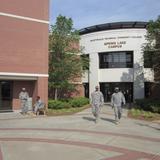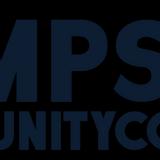- Bladen Community College is dedicated to the educational and cultural enrichment of the people of Bladen and surrounding counties. The College operates as a constituent institution to the North Carolina Community College System and is committed to opening the door to opportunity for citizens seeking to improve their lives and well-being by providing education, training, and retraining for the workplace, including basic skills, literacy, occupational, and college transfer programs; support for economic development through services to business and industry; and services which improve the quality of life for individuals and for our community.
School Highlights
Bladen Community College serves 1,459 students (36% of students are full-time).
The college's student-teacher ratio of 11:1 is lower than the state community college average of 13:1.
Minority enrollment is 58% of the student body (majority Black), which is more than the state average of 48%.
Quick Facts (2025-26)
- Enrollment: 1,459 students
- In-state tuition: $2,385
- Out-state tuition: $8,529
- Student-teacher ratio: 11:1
- Minority enrollment: 58%
- Source: Integrated Postsecondary Education Data System (IPEDS)
Top Rankings
Bladen Community College ranks among the top 20% of public schools in North Carolina for:
Category
Attribute
Diversity
Completion Rates
School Overview
The teacher population of 138 teachers has stayed relatively flat over five years.
Bladen Community College
(NC) Community College Avg.
Carnegie Classification
Associate's Colleges: High Career & Technical-High Nontraditional
Associate's Colleges: Mixed Transfer/Career & Technical-High Nontraditional
Institution Level
At least 2 but less than 4 years
At least 2 but less than 4 years
Institution Control
Public
Public
Total Faculty
138 staff
256 staff
School Calendar
Student Body
The student population of Bladen Community College has grown by 19% over five years.
The student-teacher ratio of 11:1 has increased from 8:1 over five years.
The Bladen Community College diversity score of 0.72 is more than the state average of 0.66. The school's diversity has stayed relatively flat over five years.
Total Enrollment
1,459 students
2,579 students
Student-Teacher Ratio
11:1
13:1
# Full-Time Students
525 students
766 students
# Part-Time Students
934 students
1,813 students
# Enrollment Undergraduate
145 students
316 students
# Full-Time Undergraduate Students
525 students
766 students
# Full-Time Graduate Students
n/a
22 students
# Part-Time Undergraduate Students
934 students
1,990 students
# Part-Time Graduate Students
n/a
3 students
Total Dormitory Capacity
n/a
717 students
% American Indian/Alaskan
12%
1%
% Asian
n/a
3%
% Hispanic
12%
13%
% Black
27%
21%
% White
42%
52%
% Hawaiian
n/a
1%
% Two or more races
4%
3%
% Non Resident races
n/a
1%
% Unknown races
3%
5%
Diversity Score
0.72
0.66
College Completion Rate (Students who graduate in less than 4 years)
47%
37%
College Completion Rate (Students who graduate in 4 years or more than 4 years)
n/a
43%
Average Graduate Earnings (10 Years)
$25,500
$27,500
Tuition and Acceptance Rate
The public in-state tuition of $2,385 is less than the state average of $3,915. The in-state tuition has declined by 6% over four years.
The public out-state tuition of $8,529 is less than the state average of $9,508. The out-state tuition has stayed relatively flat over four years.
In-State Tuition Fees
$2,385
$3,915
Out-State Tuition Fees
$8,529
$9,508
% Students Receiving Some Financial Aid
83%
82%
Median Debt for Graduates
$4,750
$9,500
Median Debt for Dropouts
$3,880
$6,000
Acceptance Rate
n/a
82%
SAT Reading
n/a
488
SAT Math
n/a
498
ACT Composite
n/a
20
ACT English
n/a
13
ACT Math
n/a
16
Source: 2024 (or latest year available) Integrated Postsecondary Education Data System (IPEDS) , School Administrators
School Notes
- Bladen Community College formally opened on December 16, 1967, as Bladen Technical Institute. Bladen Community College was initially located in a complex of rented buildings in Elizabeth town. The College began operation on a full-scale basis in September of 1968. Initially, curriculum programs were offered in Cosmetology, Executive Secretarial Science, Business Administration, Industrial Engineering and Agricultural Engineering Technologies, Industrial Maintenance, Automotive Mechanics and Nursing Assistant. A complete battery of extension and other part-time adult programs was started during the evenings to complement day programs. The name of the institution was changed to Bladen Technical College in 1979 and to Bladen Community College in October of 1987. A site for a permanent campus near Dublin was secured, and phase one of the College building program began in the spring of 1970. The College moved to its permanent 25-acre campus in July 1971. Two buildings totaling 27,000 square feet were included in the initial building phase and housed administrative offices, classrooms, laboratories, shops, a student lounge, and library. Bladen Community College offers post-secondary certificate, diploma, and degree programs. Occupational and vocational courses and programs are also offered through a variety of Continuing Education offerings. Workforce development is a priority of the college along with numerous programs directed at improving basic educational skills, advancing economic development, and improving the quality of life of Bladen citizens. The college is accreditated by the Southern Association of Colleges and Schools.
Frequently Asked Questions
How much does Bladen Community College cost?
Bladen Community College's tuition is approximately $2,385 for In-State students and $8,529 for Out-State students.
What is Bladen Community College's ranking?
Bladen Community College ranks among the top 20% of community college in North Carolina for: Diversity in US community colleges and Highest completion rates.
Recent Articles

Community College Success Rates 2025: Outcomes & Trends
Updated 2025 analysis of community college success rates, completion, transfer, costs, enrollment, and strategies that shape student outcomes.

Community Colleges in 2025: Combating Stereotypes with Impact
Updated insights on how community colleges are dispelling myths, growing enrollment, and expanding pathways in 2025.

2025 FAFSA Changes Explained for Community College Students
A comprehensive guide to 2025 FAFSA changes, what community college students must know, new eligibility rules, timelines, and tips to maximize federal aid.











